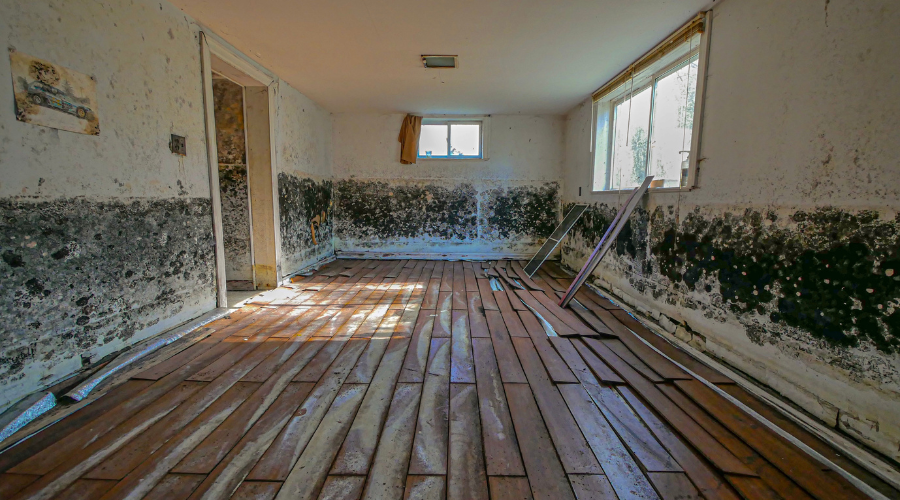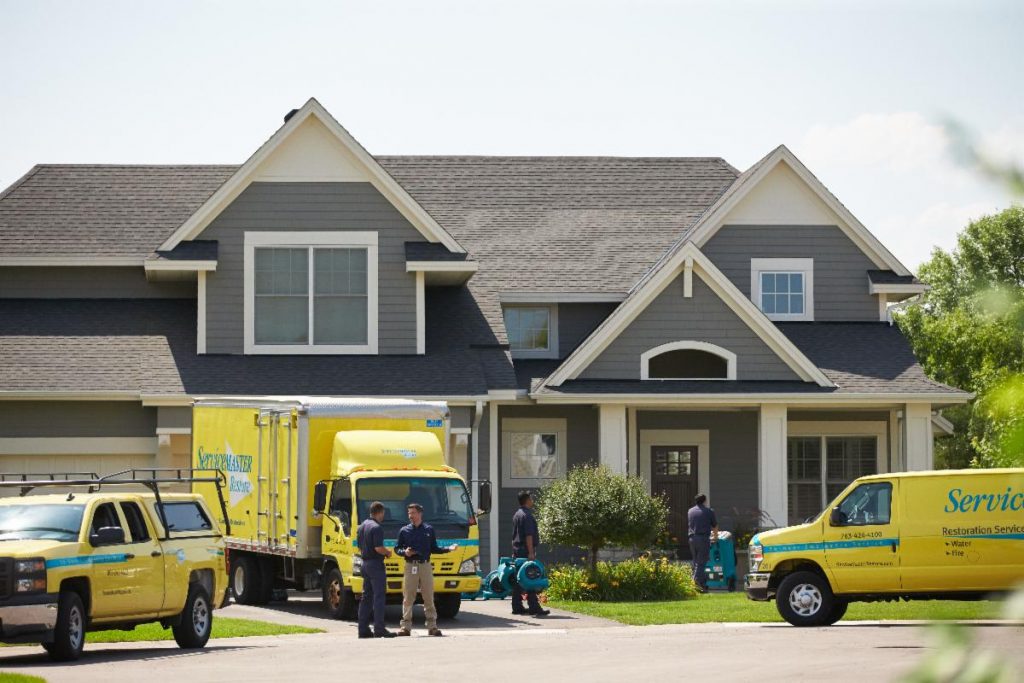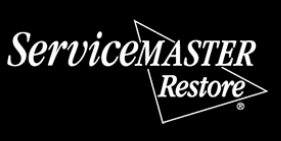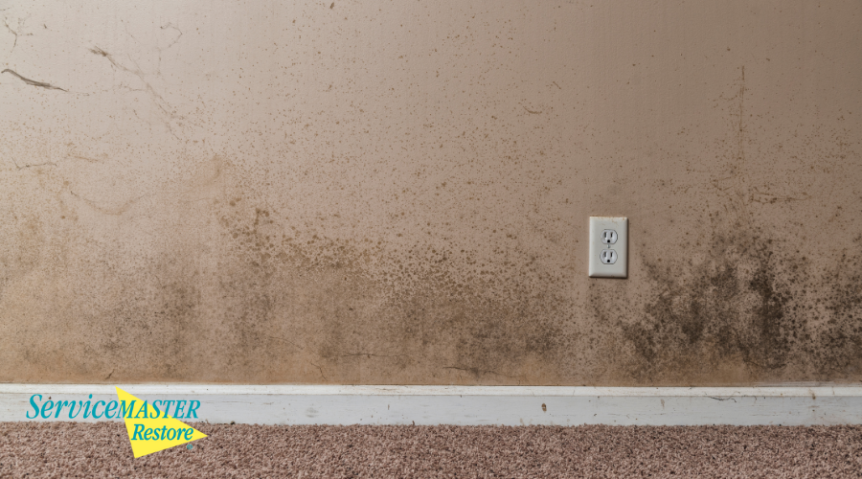Mold often appears in areas affected by moisture, particularly in basements and crawlspaces where humidity levels are high, temperatures are warm, and mold spores can rapidly multiply. Addressing mold growth as soon as it is detected is vital because the mold will continue to spread and cause additional damage. Even if the mold appears in an area that seems to be isolated, like the basement, the spores can spread a great distance and end up affecting other areas of your home.
In this guide, we’ll explore how to identify mold issues, assess health risks associated with mold, effectively remediate mold in basements, and prevent future occurrences.
How to Know If You Have a Mold Issue
Mold can be easy to spot by its smell and appearance, but it can also form in hidden areas such as behind walls that are not so easy to detect. The following are the main signs that you have a mold issue in your home:
- Musty odors
- Black or green spots on your wall or ceiling
- Allergic reactions such as coughing, sneezing, and irritation of the skin
- Discoloration or peeling of wallpaper or paint
- Structural damage to the building materials
Can Basement Mold Spread to Other Areas?
Once mold growth appears, it is always a threat to spread to other areas of the home. The mold colonies themselves expand as they take in more moisture and consume the surrounding food sources. This can cause mold growth to appear on the floors and walls above the affected areas in the basement. Mold colonies also disperse spores that can travel through the air and settle anywhere else in the home that provides the right environment for them to thrive.
One of the dangers with basement mold is that it can be hidden behind walls and ceilings or within closets and crawlspaces. Hidden mold is not usually discovered right away which gives it more time to spread and cause significant damage. It is important to regularly check the basement for mold so you can address an issue before it spreads to other areas of the home.

Can Basement Mold Affect Your Health?
Exposure to mold can affect your health. This is especially true for those who have a mold allergy. Those who are exposed to mold regularly may develop a range of symptoms, regardless of if they have an existing mold allergy. Some common symptoms of mold exposure include:
- Irritation of the eyes
- Wheezing
- Irritation of the skin
- Coughing
- Headaches
- Nasal congestion
Those who have allergies or asthma may end up with an even stronger reaction to mold exposure, including fever and shortness of breath.
Mold in the basement can affect the health of those within your home, even if everyone stays out of the basement. Basement air circulates throughout the entire house which means mold spores from the basement can also spread to other areas of your home. If people within your home start to experience symptoms of mold exposure, check your home for mold growth, starting with your basement. Any mold that you do find needs to be removed immediately to prevent its spread.
How to Remediate Basement Mold
To effectively tackle basement mold, it’s crucial to identify its source. Typically, excess moisture encourages mold spores to thrive. Look for leaks or standing water and address these issues promptly. To reduce humidity, consider installing fans and dehumidifiers. Poor drainage around your foundation can also lead to mold, so make sure to resolve any drainage issues. If you’re uncertain how to proceed, consult professionals for assistance.
The next step is to remove the mold, ensuring you take proper precautions to avoid spreading the spores. Equip yourself with protective gear, such as goggles, gloves, and respirators, to prevent skin contact with mold. To clean the affected areas, mix bleach with water in a 1:10 ratio and scrub the surface thoroughly. Alternatively, a commercial mold remover with enzymes can be used to break down the spores. Once cleaning is complete, rinse the area with water and dry it thoroughly to prevent mold from returning.
Only tackle removing the mold if the affected area is small. For significant mold infestations in your basement, it’s best to contact our professionals. We can identify the mold source and type, and safely remove it to prevent future occurrences.
How to Prevent Mold in Your Basement
Mold is preventable with the right measures in place. By taking proper precautions in your basement, you can prevent mold growth and avoid extensive damage and health issues. Here are some steps you can take to prevent mold in your basement:
- If you notice a plumbing leak, make sure to fix the problem right away. Mold growth can form within 24-48 hours of a leak.
- If you find mold growth in a small area, remove the mold immediately using the steps above. If the mold covers an area of 10 square feet or more, you will need to contact a professional.
- Insulate water pipes to prevent condensation and dripping.
- Make sure laundry rooms in the basement are properly vented.
- Your gutters and downspouts should be cleared and free of debris so that water does not pool around your foundation.
- Consider waterproofing your basement by installing a sump pump.
- Always make sure to keep the humidity levels of your basement under control using a dehumidifier or an air filtration system.
- If possible, replace any organic materials such as wood flooring, drywall, and carpeting with mold-resistant materials.

Professional Mold Removal
The basement is a hot spot for mold because the environment in most basements and crawlspaces create the ideal conditions for mold to grow. Because of this, you should check your basement for mold regularly and address mold issues as soon as possible before it affects other areas of your home. In most cases, it is best to call a mold remediation professional to handle the job safely.
Our professionals at ServiceMaster DRR provide mold remediation services to remove mold from homes and buildings. We can uncover all mold growth in basements and crawlspaces, including hidden mold, and identify the cause of the mold growth. We will then remove the mold using advanced remediation techniques and equipment and restore the damage it caused.
To learn more about our full range of mold remediation services in the San Francisco, CA area, make sure to call us at (800) 439-8833.

Steve VanDenBerg is the owner of ServiceMaster Disaster Restoration and Recovery. He has over 30 years of experience working within the restoration industry and successfully leading start-ups, turnarounds, acquisitions and mergers, and rapidly growing companies.
Steve earned his BS in Business & Accounting from Calvin University in Grand Rapids, MI and began working for DSI Holdings as their Chief Financial Officer. When Steve began with DSI Holdings, they were running an underperforming ServiceMaster Restore franchise with one location. Steve implemented new policies and procedures for accounting and finance as well as a professional sales plan that increased profits eightfold over his time as the CFO. He was then promoted to President and CEO and in this time, he expanded the company from two locations with $4M in sales to 12 locations and $45M in sales. DSI Holdings became one of the largest disaster restoration companies in the U.S. and helped with major restoration projects throughout the U.S. and around the world.
Steve purchased ServiceMaster DRR in 2015 when the business was in decline. Drawing on his years of experience in turning around struggling ServiceMaster franchises, Steve overhauled our operations, including finance, sales, and marketing, which led to a quick turnaround. Within Steve’s first 24 months, sales increased by 60 percent. Steve also helped greatly improve our operating margins and established a relationship with California’s largest residential insurance company. Under Steve’s leadership, we have become one of the largest disaster restoration providers in California.
Steve has found great success in turning around struggling and stagnant restoration franchises by changing the business model and strategy, greatly increasing sales and profits. Many of the changes he has implemented have even been adopted by the franchisor into their operating model.



